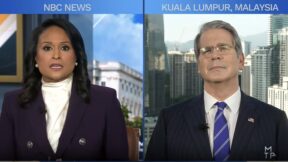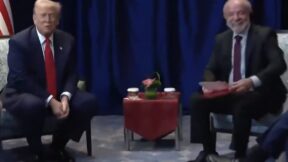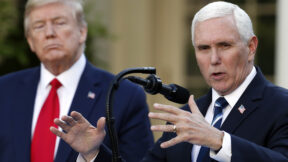Charlie Sykes Skeptical It’s Possible for CNN to Be ‘More Even-Handed’ After Trump ‘Broke the Journalism Model’
The Bulwark’s Charlie Sykes is skeptical that media outlets like CNN can truly be “more even-handed,” questioning how one would go about telling “both sides” of topics like QAnon election conspiracies.
In an exclusive interview with Mediaite in the green room after his panel at the Texas Tribune Festival in Austin, Texas, Sykes shared his thoughts on the current state of the media industry, the upcoming midterms, and the viability of independent political parties.
Team @BulwarkOnline in the house, y’all at @TexasTribune #TribFest22 @Timodc @amandacarpenter @SykesCharlie pic.twitter.com/YHLwGxPN4J
— Jennifer Harris 🇺🇦 🧂™️ (@jwharris) September 23, 2022
I’ve met Sykes several times (including at a past TribFest in 2018) and we both describe ourselves as ideological conservatives who are not supporters of former President Donald Trump. I asked Sykes who, if anyone, was a “common sense Republican” running for office this year. “Is the answer to vote Democrat or are there are there still Republicans who are on the ballot this year around the country that people can support?”
Sykes acknowledged that there were a lot of politically homeless Republicans, and it was “difficult” to just “vote Democrat,” because “in many cases, that means abandoning a lifetime’s worth of principles.”
“What it comes down to,” Sykes continued, “is whether or not you think that what’s happening right now is an existential threat to our constitutional order and whether or not a radicalized Republican Party that has shown a willingness to embrace authoritarianism and to and suppress votes and deny the legitimacy of votes — whether it poses such a danger that they can’t be trusted with power, even if you might agree with them on a lot of their issues.”
The GOP “could have moderated its position,” he noted. “It could have distanced itself from Donald Trump, it could have pushed back against Trump when he threatened the Department of Justice. It could have taken an off-ramp when he embraced the QAnon conspiracy theories.”
However, he said, the fact that the Republican Party refused to “disassociate itself” from Trump’s actions or from GOP members of Congress like Rep. Marjorie Taylor Greene (R-GA) “is an indication that perhaps that, even if you voted Republican your whole life, they’re just too toxic this year.”
I brought up Evan McMullin’s independent presidential campaign in 2016, Andrew Yang’s efforts with the Forward Party, and other attempts at launching independent third parties. I’m admittedly “deeply pessimistic” about many of these efforts, and I asked Sykes if he thought there was a current path available for an independent party.
“I’m also skeptical,” Sykes replied, “but I do think that there’s a path for a third way.” In his view, an independent party “can’t just simply be a spoiler in elections,” but will have to be “flexible” and “align with Democrats sometimes, and Republicans other times, and then go it alone.”
He called what was happening in Utah “an extraordinarily interesting story,” where McMullin is currently running another independent campaign, challenging incumbent Sen. Mike Lee (R-UT). The Utah Democrats decided not to run a candidate and to throw their support to McMullin. It’s an “interesting model,” said Sykes, and he said he was “intrigued” by the possibilities, “particularly in the hardcore red states” like Utah.
A Sept. 3-21 poll conducted by Dan Jones & Associates for Deseret News/Hinckley Institute of Politics found the race to be “the closest statewide election Utah has seen in decades,” with 36% of registered Utah voters saying they would vote for Lee, 34% for McMullin, 13% for another candidate (there are two third-party candidates and write-in candidates are allowed), and 16% undecided. The poll had a sample size of 815 and a margin of error of +/- 3.43%. The poll’s results were “virtually the same” when looking at just likely voters, with 37% picking Lee, 34% McMullin, and 16% undecided, with a margin of error of +/- 3.49%.
McMullin’s campaign is also drawing hope from the fact that Lee’s approval ratings have been underwater for awhile. That Deseret News/Hinckley poll showed 45% disapproved of Lee’s performance (34% strongly disapprove and 11% somewhat disapprove) compared to 40% approve (20% somewhat approve and 20% strongly approve), with 16% saying they didn’t know.
Sykes said he was “skeptical” of Yang, because he was “not sure that it’s well thought out…that they’ve worked out what their party stands for.”
“The GOP has no platform and neither does Forward,” I commented, referring to the Republican National Committee’s notorious decision to forgo a party platform, instead passing a resolution pledging to “continue to enthusiastically support the president’s America-first agenda.”
“Exactly,” replied Sykes. “See, this is the problem. I think there’s an appetite for a third way. But is there an appetite for a third party that has no platform, that cannot tell you what principles it supports? I don’t think so.”
I asked Sykes if there were any Republicans on the ballot this year anywhere in the country, including congressional or state candidates, who were “common-sense principled Republicans” and if he lived in their districts, he would vote for them.
“Well, let’s think about the House of Representatives for a moment,” he replied. “Only nine Republicans voted to pass that Electoral Count Act –”
“And they’re all leaving,” I pointed out.
“Right, he said. “So no one on the ballot this year voted in favor of that.”
There might be gubernatorial or other local and state candidates who were worth supporting, he explained, but politics have become so “nationalized” that “a vote for any Republican candidate for the House is a vote to make Kevin McCarthy or Elise Stefanik or Marjorie Taylor Greene the Speaker. Any vote for Republican Senate candidate is a vote to put Mitch McConnell in as Majority Leader.”
Sykes noted that many people like to say they “vote for the man, not the party,” but questioned if there was a meaningful distinction anymore for congressional Republicans. “That’s part of the problem…which men, which women are willing to stand up to the party? And the answer for Republicans right now is virtually none.”
The members of Congress who were willing to stand up to the party have “all been purged,” Sykes said, like Rep. Liz Cheney (R-WY) and Rep. Adam Kinzinger (R-IL), the only two Republicans on the Jan. 6 committee, neither of whom will be returning to Congress next year.
“Republicans are making it very clear that it is not a big tent and they’re completely okay with making their tents smaller and crazier,” said Sykes. “If you do not check certain boxes — and not necessarily about public policy, but about your willingness to embrace election denialism — unless you’re willing to check those boxes, there is no place for you in the Republican Party. They made that very clear.”
Interestingly, I posed a similar question to former Rep. Will Hurd (R-TX), catching him in a quick moment after his book signing on the first day of TribFest, and he took the position that there were “plenty of common-sense Republicans.” He didn’t name any names but said there were “some” running in Houston and north Texas.
It’s true there are a number of congressional members from those areas who keep their names out of Mediaite headlines, and in a congressional delegation that includes Rep. Louie Gohmert (R-TX), they may all look more reasonable by comparison, but that’s still not the same as being willing to stake out a position that isn’t in sycophantic lockstep with Trump.
Hurd did have a salient point about the importance of early action during the primary process. “This is also about how do we get more people involved in the primary process so we have better choices when it comes to November,” he said. “We oftentimes start paying attention about elections in October. Well, guess what? We really need to start paying attention in mid-January.”
I concluded the interview by asking Sykes, who is also an MSNBC contributor, for his take on the current media environment, which has become increasingly siloed over the years, but we’ve also recently seen CNN go through some very public efforts to “pivot and be more objective-based vs. criticism of Trump.” With the information people access being so critical to a functioning democracy, is there a point where a news outlet is “going too far” when attempting to play “both sides”?
“I think what’s happening to American democracy is really a product of what’s happening to the media ecosystem, what’s happened over the last few years, the alternative reality silos that have been created,” Sykes replied. “One of the things that Donald Trump has done is he’s broken the journalism model and no one’s figured it out, really, how to do good, honest journalism with somebody that lies like this.”
If CNN “wants to be more even-handed,” Sykes said he found it “kind of interesting” they would choose to do so “at this moment of the most extreme danger, when you have the former president talking about overthrowing an election and embracing conspiracy theories, to say, ‘yeah, maybe we shouldn’t be so critical of it, maybe we should tell both sides of this.'”
“What is ‘both sides’ of the QAnon election conspiracy?” he said. “I don’t know how that’s going to work out.”
It was a problem, he said, how “cable news increasingly has morphed into a safe space for partisans on both sides,” and “whether CNN can come up with a safe space for people who want both sides, I don’t know. I just don’t know how you navigate a moment like this.”
Video by Sarah Rumpf for Mediaite. Follow Mediaite’s coverage of TribFest 2022 here.
[Disclosure: Sarah Rumpf was the digital communications director for McMullin’s presidential campaign in 2016.]




